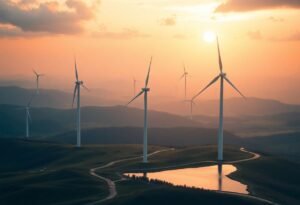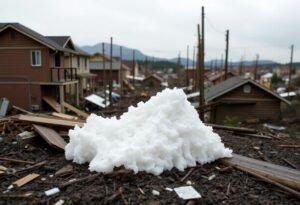The future of wind power plays a crucial role in sustainable development. As we seek innovative solutions to combat climate change, harnessing wind energy presents a viable path forward. This article explores advancements in wind technology and their potential impact on sustainable growth.
Innovations Driving Wind Power Efficiency
In recent years, significant technological innovations have transformed the wind energy sector. From advanced turbine designs to smart grid technology, these advancements aim to increase the efficiency of wind power generation. Modern turbines are engineered to capture wind energy more effectively, even in low-wind conditions, allowing operators to maximize output while minimizing costs. Furthermore, predictive maintenance powered by artificial intelligence ensures that equipment operates optimally, reducing downtime and enhancing overall energy productivity.
Sustainable Development Goals and Wind Energy
The integration of wind energy contributes significantly to the United Nations Sustainable Development Goals. Particularly, it aids in achieving affordable and clean energy (Goal 7) and combating climate change (Goal 13). By investing in wind power infrastructure, countries can reduce their reliance on fossil fuels, improving air quality and creating sustainable jobs in renewable energy sectors. Such initiatives not only benefit the environment but also stimulate local economies.
The Role of Policy in Advancing Wind Power
Government policies play a vital role in promoting wind energy adoption. Incentives such as tax credits, feed-in tariffs, and renewable energy mandates encourage investment in wind projects. Countries with supportive policy frameworks have seen rapid growth in wind installations. This creates a productive environment where innovation can flourish, leading to enhanced technologies and reduced costs for consumers. Collaborative efforts among governments, businesses, and communities are crucial for maximizing wind power’s potential.
Challenges Facing Wind Energy Implementation
Despite its promises, the wind power sector faces significant challenges. Issues such as intermittent energy supply and the need for energy storage solutions must be addressed to transition towards a sustainable future effectively. Innovations in battery technology and energy management systems are vital in overcoming these hurdles, ensuring a stable and reliable energy supply from wind sources. Such developments will enhance the integration of wind energy into the broader energy mix.
The Impact of Wind Power on Local Economies
The development of wind farms can substantially boost local economies. Job creation in areas such as manufacturing, installation, and maintenance of wind turbines contributes to economic growth. Community engagement is essential during the development of wind projects to ensure that local interests are considered. Moreover, many wind farms provide landowners with reliable income sources, fostering a positive relationship between the energy sector and local communities.
Future Trends in Wind Power Innovation
The future of wind power is bright, with ongoing research leading to new trends in the industry. Innovations like floating wind farms and the integration of IoT technologies for real-time monitoring hold promise for increased efficiency and reduced environmental impact. As the global demand for renewable energy grows, the wind power sector is poised to play a pivotal role in establishing a sustainable energy future. Continuous innovation coupled with supportive policy frameworks will be critical in realizing the full potential of wind energy.
This article is for informational purposes only and should not be considered as financial or energy policy advice.





















